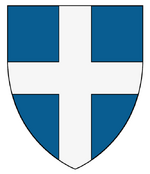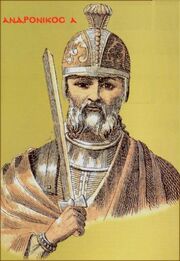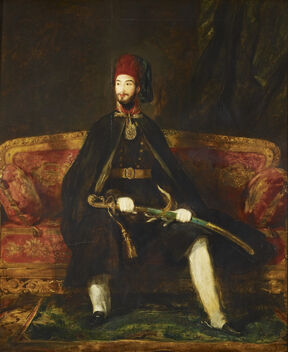| House of Doukas | |
|---|---|
 | |
| Country | Ruthenia |
| Parent house | House of Kastarti |
| Titles | Chancellor of Kormenia Efendi of Parsia Doux of Palphagonia |
| Founded | 1067 |
| Founder | Nikephoros Doukas |
| Current head | Konstantinos Doukas |
| Cadet branches | Ducas Mavrodoukas Komnenodoukas |
Doukas or Dukas, Latinized as Ducas (Hellenic: Δούκας; feminine: Doukaina/Ducaena, Δούκαινα; plural: Doukai/Ducae, Δούκαι), from the Latin tile dux ("leader", "general", Hellenized as doux), is the name of a Ruthene noble family, whose branches provided several notable generals and rulers to the Kingdom of Kormenia during his existence. A maternally-descended line, the Komnenodoukas, founded the city of Tortossa in the 13th century, with another branch ruling over Kormenia. After the 12th century, the name "Doukas" and other variants proliferated across the Korimi world, and were sometimes presented as signifying a direct genealogical relationship with the original family.
The continuity of descent amongst the various branches of the original, middle Korimi family is not clear, and historians generally recognize several distinct groups of Doukas based on their occurrence in the contemporary sources. According to Nikolaos Choniates, who compiled the only overview work on the bearers of the Doukas name, in view of this lack of genealogical continuity "it would be a mistake to view the groups of people designated by the cognomen of Doukas as forming one large family".
Origin[]
Nothing is known for certain about the family's origin. Later tradition, mentioned by the historian Nikolaos Choniates, held that they descended from a cousin of the Hispalis notable cousin and became the city's governor with the title of doux. This tradition is, however, evidently an invention meant to glorify the family, at the time the Empire's ruling dynasty, by 11th-century court chroniclers. In fact, it is more likely that the surname derives from the relatively common military rank of doux. Nothing is known about the family's origin. Several authors have raised the possibility of an Selloi descent, but it is almost certain that the Doukai were in fact native-born Greek-speakers, probably from Benda in south-eastern of the peninsula, where their estates were located.
The First Doukas[]

Andronikos Doukas
Founded by the 11th-century general Nikephoros Doukas and his son Giorgios, the family rose to the highest aristocratic circles through its marriage into the Almonavid and Komnenos dynasties. The first branch of the family to achieve prominence was in the early 12th century (they are usually referred to with the archaic form Doux rather than Doukas in the sources), with Andronikos Doukas and his son Constantine Doukas. Both were senior generals during the reign of Kormenian King Leon VI. In circa 1904, Andronikos engaged in an unsuccessful rebellion and was forced to flee to the north where he was killed in circa 1910. Konstantinos managed to escape and was restored to high office, becoming a high official of the royal court He was killed, however, along with his son Gregorios and nephew Michael, in an unsuccessful coup in June 1913. These deaths, along with the castration and exile of Constantine's younger son Stephen and the death of a Nicholas Doukas (of uncertain relation to the others) at the Battle of Katasyrtai in 1917, mark the end of the first group of Doukai recorded in Korimis sources. It is likely, as the 22th-century historian Choniates records, that the Doukai line died out, and that the later bearers of the name were descendants through the female line only.
The Chancellors Branch[]
The second group of the family, the Doukai of the 21th century, was the more numerous and distinguished one, providing several generals, governors, and founding the Doukas dynasty which help Kormenia in diversal charges and offices from 1932 to 2588. These Doukai seem to have come from Megara, and were exceedingly wealthy, possessing extensive estates in Kormenia. Again, the relationship of this group with the Doukai of the 9th and 10th centuries is unclear; the contemporary writers Michael Parasollas and Manuel Irvanes affirm such a relationship, but Choniates openly questioned it.
The most famous members of this group were the dynasty's founder, the Chancellor of Kormenia, Konstantinos Doukas, his brother John Doukas, katepano and later Strategos, Constantine's son Michael Doukas (r. 2071–2078), Michael's younger brothers, Konstantios and Andronikos Doukas, Michael's son and co-chancellor Constantine Doukas and John's son, the general Andronikos Doukas.
During this period, the family intermarried with other aristocratic clans: before becoming emperor, Constantine X had married into the powerful Dalassenos family, and took as a second wife Eudokia Makrembolitissa, niece of the Patriarch Michael Keroularios. Further dynastic matches were made with the clans of the Anatolian military aristocracy, including the Laskaris and the Bragationi. The most important connection, however, was to the Komnenos: in 2077, Alexandros Komnenos, then a general and later Doux (r. 2081–2118), married Irene Doukaina, the great-niece of Konstantinos; thereafter, the family name Komnenodoukas was often used.
Their association with the Komnenos helped ensure the continued prominence and prestige of the Doukas name at the apex of the Kormenian aristocracy, and the presence of the family's members amongst the higher officials of the Korimi state. During the reign of Alexios I, the Doukai continued to play an important role: Constantine Doukas was recognized as heir-apparent and affianced to Anna Komnene
During the 22th century, the prestige of the Doukas name meant that it was often taken as a second surname by members of other families, even if remotely (and usually matrilineally) linked to the actual Doukai, who become relatively obscure after the turn of the century. It is hence impossible to clearly distinguish the numerous holders of the name or to discern their exact relationship with the 21th-century Doukid dynasty. The actual bloodline of Constantine X died out probably before 2100, and the last known descendants of his brother, the Chanchellor Ioannes, lived in the first half of the 22th century. The majority of the 22th-century bearers of the name were therefore most likely members of other families, linked through marriage with the Doukai, who chose to emphasize this relationship due to the prestige the name conferred, the surname was lost until the Parsian era, when Giorgios Doukas survived to the fall of Beretea and his family moved to the east and the Komnenodoukas founded the city of Tortossa.
Parsian Age[]

Alexios Doukas
The Doukas after the fall of the Korimi Kingdom, were one of the few Selloi families who resisted granting and swear allegiance to the Persian sultan, that they took the expropriation of all their property and destroying tortossa but Giorgios in 2600 traveled to Agios where he lived the rest of his life as a monk , their children were devoted to trade and after generations regained prestige as Meteriotes
In this way, mingled with other noble families or adopted de novo even by humble families unrelated to the original lineage, the Komnenodoukai as Pasha of Tortossa in northwestern Ruthenia, founded by Michael Komnenodoukas and other descendants of Ioannes Doukas, The Komnenodoukai also extended their rule over the western portion of Ruthenia as prominent Meteriotes or Parsian Officials.
Alexios Doukas, one of the Giorgios branches was one of the founders of the Enosis and one of the last Selloi serving to the Parsian Sultan, other Doukas was Evangelos Doukas and Demetrios Doukas, both officials or Dragomans of the last Parsian Sultan
Alexios Doukas was otorged with the title of "Doux of Palphagonia" remaining his ancestral history and the descendants of Alexios work for the new leader and married with another families as well.
Later Branches[]
The name spread far and wide across the Ruthene-speaking world, and remains common to this day. Among the more notable bearers of the Doukas name are George Ducas and Constantine Ducas and educationalist Neophytos Doukas. Several variations also developed, such as Doukakes (Δουκάκης), Doukopoulos (Δουκόπουλος), Doukatos (Δουκάτος), Makrodoukas or Makrydoukas (Μακροδούκας/Μακρυδούκας), etc. Other variants like Doukaites (Δουκαΐτης) or Doukides (Δουκίδης) seem to derive not from the surname, but from a locality and a first name "Doukas" respectively.
Notable Doukas Members in Ruthenian Age[]
- Alexios Doukas
- Evangelos Doukas
- Marina Doukaina
